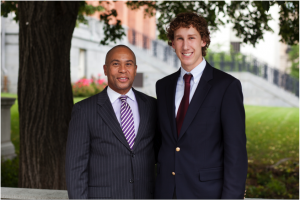By Sam Livingston ’14
This is the second installment of a two part piece on Sam’s summer internship.
Since the judicial nomination process is arduous, involving a mountain of paperwork for both the JNC and the applicants, a support staff is needed to coordinate the process. The JNC has an executive director and an assistant executive director. They are charged with presenting relevant information in a clear way to the JNC commissioners, who are unpaid volunteers with full time jobs. I was one of two summer interns.
The first thing impressed upon me was the absolute need for confidentially. All information about applicants and the content of the JNC meetings is highly sensitive. I always kept this in mind.
I fielded questions from applicants over the phone, and read applications and entered selected information from them into the database. I filed a constant stream of recommendation letters. I worked with the governor’s legal counsel, attended and took notes at JNC meetings, sat in as an observer at the hearings of the Governor’s Council and ran errands in and around downtown and Back Bay.
The most interesting and rewarding part of the internship was attending the JNC meetings at Nelson, Mullins LLP, as I felt I was seeing the culmination of my contributions to the process. I individually greeted the three or four judicial candidates at the door and showed them to a waiting room. I spoke to them in a calm, friendly, and reassuring manner before they each went into an interview alone in front of all the JNC members. They were men and women of accomplishment, much older than me and they were nervous. I observed the interviews and appreciated the importance of a successful interview. Fielding questions, good preparation and good presentation are considered indicative of how an applicant will perform on the bench. I met and spoke to all of the members of the JNC over the course of the summer. I especially liked meeting Chairperson Macey Russell, who graduated from Trinity in 1980.
A challenge of the internship was attending the Governor’s Council meetings which, unlike meetings of the JNC, were open to the public. The Lt. Governor and the Governor both attended to chair the meeting from time to time. These meetings were raucous and political. Sometimes they seemed out of control. They truly tested my faith in the democratic process because I wondered if this fighting would lead to the best results. The chairman of the meeting frequently slammed the gavel on its stone base and accused another councilor of “being out of order” when the chair had heard enough.
In these hearings the councilors openly challenged the Governor’s choices, as their vote is required for approval of a judgeship. There would always be a few councilors brutally listing every political donation a candidate had made in the last ten years. Then they would move on to the candidate’s spouse and list their contributions as evidence of an ideological bias within the household that would affect the independence of the candidate if he or she were a judge.
At one meeting, the councilor from my own district, Mary-Ellen Manning, refused to approve a treasury warrant that funds the state government, until Lt. Governor Tim Murray turned over his state-funded cell phone records. The records would show whether he was texting or who he was calling on the November morning he totaled his state Crown Vic at four in the morning going over 100 mph.
Despite the protections built into the process there is still a concern that that the selection of judges can be an inside job because judicial selection is completely within the power and domain of the executive branch in Massachusetts. Until the process reaches the Governor’s Council, that is.
I learned to appreciate that the views of the councilors are a necessary part of the process, just like my work at the JNC. They represent the people of their districts and do not hesitate to be adversarial to the Governor, whereas we support all the Governor’s initiatives. For example, this summer Lt. Governor Tim Murray filed a disclosure of appearance of conflict of interest with the State Ethics Commission because he had a long-standing friendship with the family of a judicial nominee. The Governor’s Council criticized the Governor and the news made headlines. The Boston Herald berated the Governor for a nominee so closely associated to his administration. I appreciate this as I know all the work the JNC does to offer choices of qualified candidates. It so happens that as part of my job I received and reviewed this very disclosure document and then delivered it in person to the State Ethics Commission. I felt connected to this controversy and it helped me put all the perspectives together.





